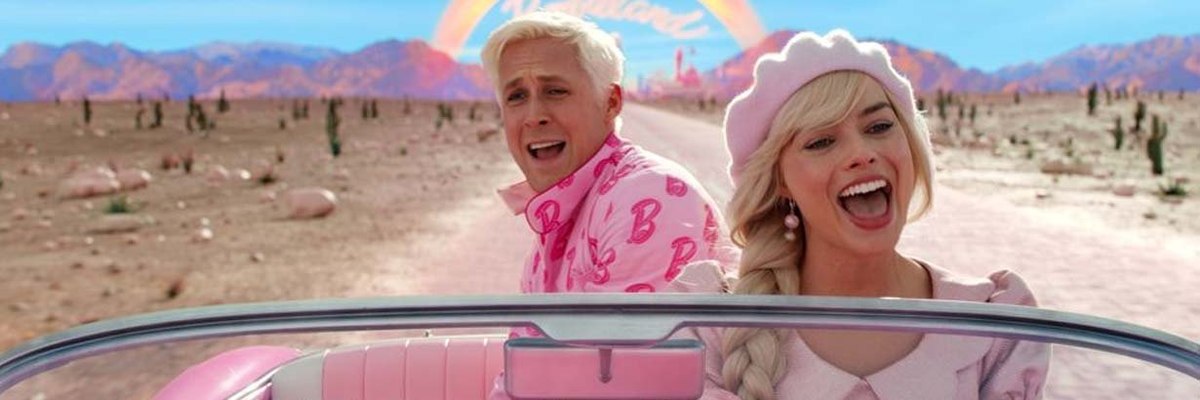It’s only a few weeks since much of the nation was consumed with a disagreement about two blockbuster films. Which would turn out to be the Film of the Year? Would it be Oppenheimer or would it be Barbie? Surely, said one side, it had to be the film that dealt so powerfully with the single issue that has overshadowed our planet for eighty years: the successful testing of the world’s first atomic bomb. The idea that it might be trounced by the other film, based on a silly doll that has fascinated little girls since it was first created in the 1980s, was unthinkable.
As the critic Sarah Ditum put it before the films even opened in the West End we might very well be thinking this would be “a contest between manly existential seriousness and hot-pink frivolity”. And since when, she asked, have multiplex audiences ever been known for their willingness to take the hard intellectual path? A fair question, you might think.
And that, wrote Ditum and many other critics, is precisely what has happened. So the next question is why- and what does it tell us about our susceptibility to the charms of a film that, on the face of it, is about as lightweight and inconsequential as a Barbie doll itself.
The answer seems to be that it is not so much a film about Barbie as it is about her boyfriend Ken, played by the actor Ryan Gosling. And the appeal of Ken, according to many observers of the social scene, is that he is the precise opposite of a certain category of men who have, it seems, come to dominate social media for a disturbingly long time. A classic example of the genre was the so-called “influencer” and former kickboxer Andrew Tate.
As the Times commentator Alice Thomson put it Tate “dominated social media with his slap, grab, choke language about women knowing their place in the patriarchy. Panic set in, toxic masculinity appeared to have taken over… He stacked up millions of young followers and 12 billion views with his advice to young men to stop feeling downtrodden, fight back against the ‘feminazis and control their ‘bitches’. Boys deserve fast cars, girls shouldn’t drive, he said. Women may snivel, real men don’t show emotion.”
Strong stuff indeed and Thomson was hardly the first commentator to bemoan the appeal of the Tate “brand”. But a year later, she writes, no one much cares about Tate. Last week he was released from house arrest in Romania while a court decides whether he will face trial for alleged rape and human-trafficking centring on his online sex-cam business. Now, she reflects, he seems a lonely figure.
Similar observations are being made on social media and in the so-called mainstream media about Jordan Peterson, once described as “custodian of the patriarchy”. Peterson’s background bears no resemblance to the pugnacious Tate – he’s a professor of psychology - but he too laments the time when the “masculine spirit” reined supreme. In his worldview order is masculine and chaos is feminine. “We have to rediscover the eternal values and then live them out,” he says.
But that was then and this is now and now, it seems, that those who rant about male supremacy are given short shrift. What makes the Barbie film so interesting is that most reviewers seem to agree that the most important character is not Barbie but her boyfriend Ken. And yet, on the face of it, he is exactly the opposite of interesting. Deeply dull might be a more accurate description.
The way he is treated by Barbie in Barbieland verges on the contemptuous. He’s not even allowed to sit in the front of her car: an extravagant Cadillac obviously. He would like to impress his friends with his skills as a surfer but he’s pretty hopeless at it. He’s really much happier just sitting on the beach and being generally ineffectual. And when he does try to make his mark on the world with a rather pathetic attempt to introduce male superiority to Barbieland, it is doomed to fail. But that doesn’t matter because his heart was never really in it in the first place. In truth he’s perfectly happy just hanging out with Barbie and her friends.
At this stage you might be wondering what on earth a rather silly Hollywood movie we had assumed would be aimed at impressionable little girls has to do with the grown-up world and why it is being taken so seriously by critics and even political commentators. A world in which men like Tate and Peterson had come to exert so much influence. A world in which, they claimed, women had to know their place – and that place was being subservient to men. Here’s how the astute Alice Thomson puts it:
“Ken is proving a much better role model. He’s just as fit as Tate but that’s where the comparisons end. He’s gentle, funny and thoughtful. In other words, he is to Tate, and other insecure would-be dominant men, a worst nightmare: the nice guy in a world of alpha women who bases the success of each day on whether his girlfriend is happy.”
That may be fine for the Ken of Barbieland but it seems that in the real world more and more men are embracing what Thomson calls “their inner Ken”. The question is why? After all he doesn’t have a real job, doesn’t enjoy war games, enjoys hanging out with women but doesn’t want to control them. And yet he doesn’t feel emasculated.
And yet, many men are going to see the film, with figures suggesting a third of the audience are male. And the film has even won the approval of world leaders. Not only did Justin Trudeau admit to having seen it, he even wore pink. Our own Rishi Sunak went with his young daughters and gave every impression of having enjoyed it. So did Matt Hancock. Indeed he made a video for TikTok of himself lip-syncing to the song “I’m Just Ken.” Thomson called it perhaps the most embarrassing TikTok of the year and maybe that’s true. But more than two million viewers watched it.
It's tempting, as Thomson acknowledges, to regard this reaction as no more than virtue signalling. But she’s not alone in seeing it as more than that. After all, the song “He’s Just Ken” has gone viral and the essence of it is that men can feel comfortable without being exceptional: “The film feels less about female emancipation and girl-power than a meditation on the state of masculinity. Ken has stolen the first billion-dollar feminist film — typical man — and yet you can see why.”
The message of Barbie’s Ken is that it’s fine to hang out with girls just because you like them and enjoy their company and you don’t have to dominate them – either physically or in any other way.
What’s your take on all this? Do you believe that young white men have been unfairly vilified by society as a whole? Is it your perception that the tide is turning against men like Andrew Tate and Jordan Peterson who preach the superiority of men over women? And have you seen Barbie yet. And if not… do you plan to?!
Let us know.










